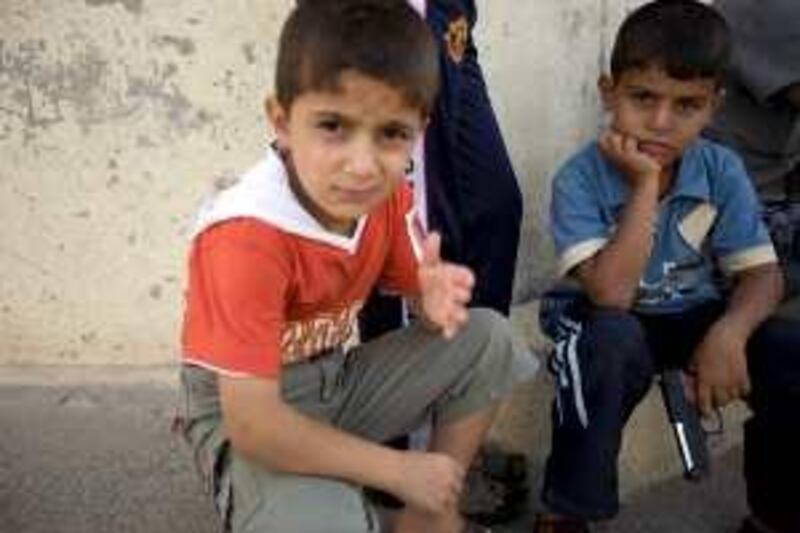BAGHDAD // Tribal leaders in Anbar province have warned that extremists influenced by the al Qa'eda terrorism network have resumed efforts to recruit children as suicide bombers. Although the insurgency in Iraq has been weakened since the height of its power in 2006 and 2007, violent groups remain active. Sheikhs in Anbar, a place once synonymous with Islamic militancy, say insurgents are trying to regain their grip using local youngsters.
"We believe there are some sleeper cells of al Qa'eda here, a few men who are still with them but who have been keeping themselves quiet until now," said Sheikh Salem al Dulaimi, who lives in Zaidan, a village on the Euphrates River, near Ramadi. He heads a sahwa council, one of the tribal groups that turned against al Qa'eda and sided with US forces, a move that played a significant role in stabilising the country.
"They [al Qa'eda] have started a propaganda campaign, talking about the role for juveniles in attacking Iraqi security forces, the Americans and the sahwa councils in Anbar. "We believe they are co-operating with the Army of Naqishbandi [a Sunni insurgent group] to recruit children as suicide bombers. The propaganda calls for boys and girls to join them." Sheikh al Dulaimi said that, as a result, children were increasingly being viewed with suspicion in the area.
"It's dangerous and when someone has sworn their allegiance to al Qa'eda, it is hard to undo that sort of brainwashing. We all need to find a suitable solution to this problem; we can't have children being sent in on military operations or suicide attacks." One young member of the Zaidan sahwa council, a 16-year-old named Samer, said he had previously admired al Qa'eda and had considered himself an al Qa'eda member when the fighting against US forces in Anbar was at its peak.
"I was ready to hand over the people closest to me if they had been named on their [al Qa'eda's] wanted lists. I was afraid of al Qa'eda and felt I owed them my loyalty," he said. "I regret it now and I wonder what I was thinking. I can see it's an organisation that can convince people to kill everything, themselves and other people. It has a powerful effect on boys." Radical Islamic militants have previously used children as a means of attacking government or US targets, according to Iraqi police and US intelligence officers.
In April Iraqi special forces arrested four children under the age of 14 who had apparently been recruited by al Qa'eda to carry out suicide attacks in Kirkuk. The children told the authorities they were "birds of paradise", a name believed to be derived from the traditional Islamic belief that when children die they become birds in heaven. A US soldier currently deployed in Kirkuk said in an interview that he had seen a young teenager throw an armour-piercing hand grenade at a military truck in his convoy. "I was watching this kid and he threw the grenade at us, and [I] had a clear shot, but I couldn't take it," he said, requesting that his name not be published.
"I couldn't pull the trigger because it was a kid. I had to shoot someone in Baghdad on my last deployment and I don't want to do that again. It costs you something when you kill someone. I probably should have, but I didn't. He threw the grenade and ran." Another US soldier now in Kirkuk said that while serving in Mosul this year, an eight-year-old boy had walked up to an Iraqi police patrol and shot an officer in the face with a pistol. The police had assumed the gun was a toy - children commonly play with plastic weapons on Mosul's streets, despite repeated warnings that they might be shot by mistake.
Fears of an al Qa'eda revival are beginning to rise in Anbar province as US forces pull back from their front-line role. Violence there has increased in recent weeks and tribes that entered the sahwa movement and co-operated with US troops say they are concerned about being abandoned and, without US military assistance, more easily targeted by the militants they fought. On Tuesday, a car bomb exploded in the town of Amiriya in Anbar, killing at least 11 people and wounding 31. At the end of last month a suicide bomber killed seven police officers and wounded 10 other people when he blew up a lorry loaded with explosives west of Ramadi.
Hadi Amiri, an Iraqi member of parliament and head of its security and defence committee, said attempts to recruit children showed al Qa'eda was weak and failing. "The fact that they are recruiting children as suicide bombers to kill sahwa members is further evidence of the bankruptcy and the shallowness of their thinking," he said. "We've seen al Qa'eda exploiting widows and the mentally ill for their attacks and now they are resorting to this."
nlatif@thenational.ae psands@thenational.ae





